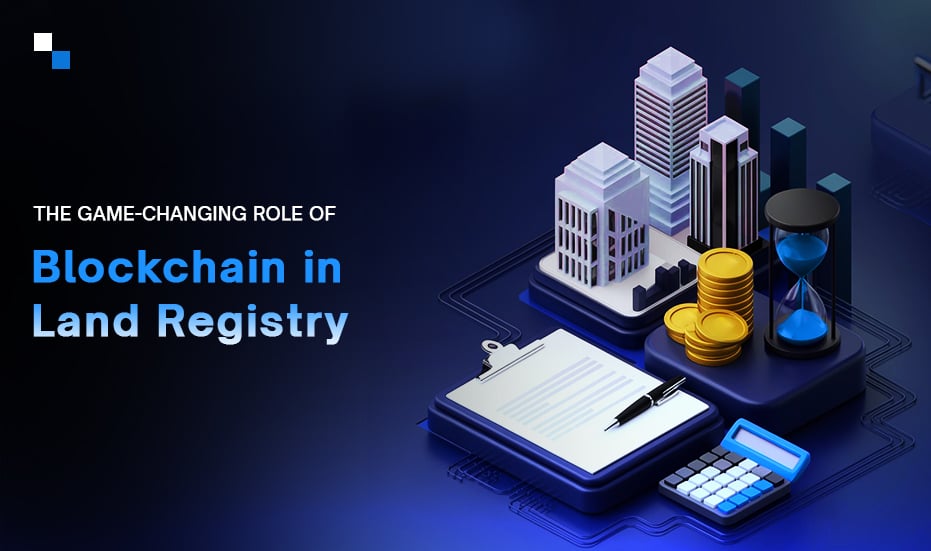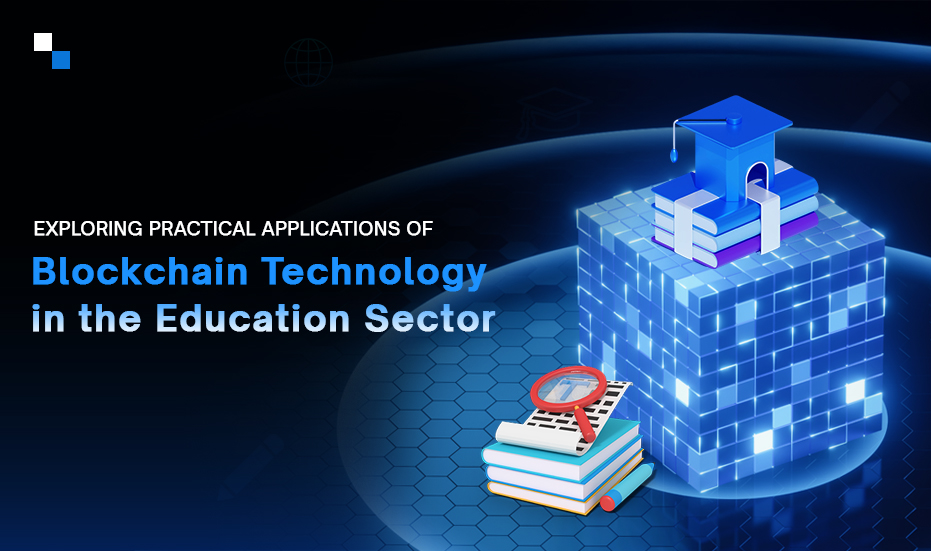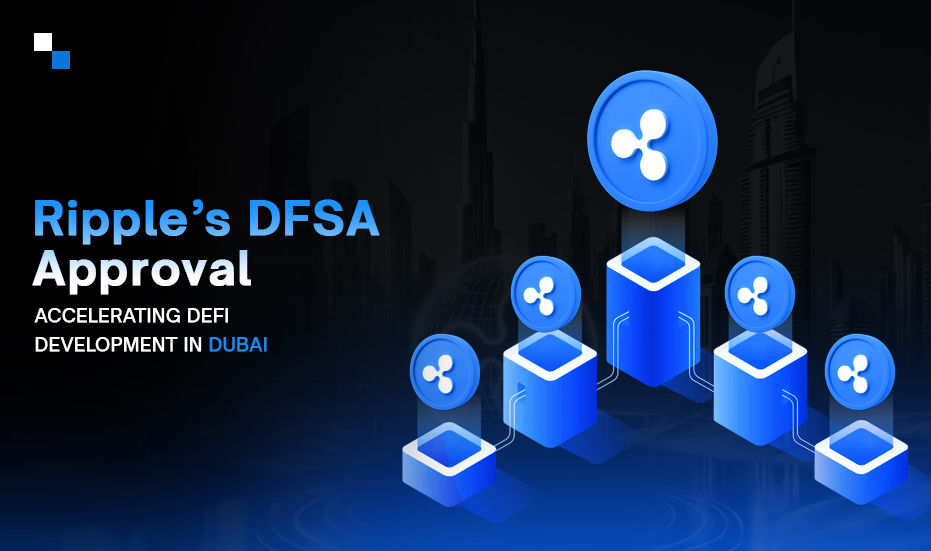
Future-Proofing Your Crypto Wallets: The Rise of In-App Trading and Yield Farming
March 27, 2025
Helium Wars Token Earns Spot in Prestigious 2025 Crypto Presale Rankings
March 28, 2025In today’s modern world, where digital innovation is redefining industries, one of the aspects of real estate, the land registration system, is in dire need of transformation. The land-related scams worldwide, ranging from forged documents to illegal sales of non-existent plots, continue to plague property markets. These scams not only create massive financial losses, but also lead to prolonged legal battles, which erode trust in real estate systems. What’s the solution, then? Blockchain!
Blockchain is disrupting real estate, including the land registration system, with its promise of transparency, immutability, and automation. Adopting blockchain-based land registry projects can be the ultimate solution to counter fraud, delays, and administrative bottlenecks in the system.
In this blog, we explore the challenges of current land registry systems and why using blockchain for land registry could be a savior.
The Current Land Registry Landscape: A Broken System
The following are the core issues of current land registry systems that stem from their dependency on manual, centralized, and paper-based processes.
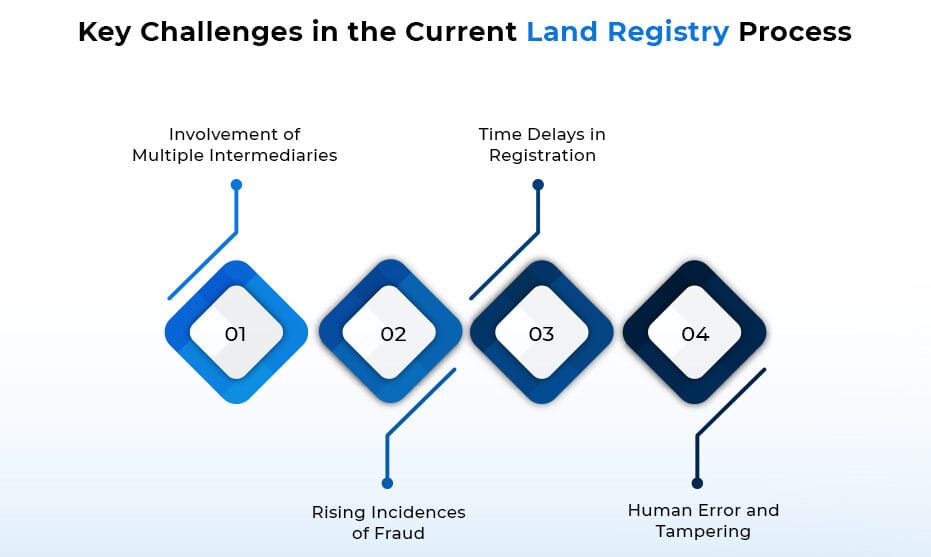
1. Involvement of Multiple Intermediaries
The current land registration systems rely heavily on a web of intermediaries, including brokers, agents, notaries, government officials, and financial institutions. While they may offer support, their involvement often leads to unnecessary complexity, slower processes, and higher transaction costs. These intermediaries also control crucial property information, which isn’t easily accessible to buyers or sellers. This dependency on third parties creates bottlenecks, increases the chances of miscommunication or manipulation, and slows down the already lengthy process of verifying and transferring property ownership.
2. Rising Incidences of Fraud
Land-related fraud remains a serious challenge in many regions. Scammers often impersonate rightful property owners using forged documents or fake IDs, which results in illegal sales and massive financial losses. The lack of instant verification tools and a centralized, tamper-proof registry allows these fraudulent transactions to go unnoticed until long after the fact, typically during audits or legal checks. Such vulnerabilities in the system expose honest buyers and sellers to legal disputes and loss of money, property, and trust in real estate transactions.
3. Time Delays in Registration
In most countries, transferring land ownership and registering titles is a lengthy bureaucratic process that can take several months or longer. These delays cause uncertainty, hinder important business or development decisions, and often require frequent follow-ups with multiple agencies. The waiting period can affect everything from lease agreements to funding approvals. This outdated pace fails to keep up with the demand for faster, more transparent transactions and leaves buyers and sellers frustrated and economically disadvantaged.
4. Human Error and Tampering
Manual entry and paper-based recordkeeping expose land registry systems to frequent human errors, misfiling, and even intentional tampering. Mistakes in key information, such as boundaries, ownership names, or property IDs, can lead to years of legal battles. Moreover, physical documents are vulnerable to loss, theft, or destruction due to fire, water damage, or mishandling. Without a digital backup or audit trail, verifying original ownership or correcting mistakes becomes time-consuming, expensive, and often nearly impossible.
Blockchain for Land Registry Platforms: A Digital Foundation for Trust
Blockchain is often called the “internet of value,” and for good reason. It allows data to be stored in a decentralized, tamper-proof ledger. Every transaction is time-stamped and verified by a network of nodes, which makes it nearly impossible to alter historical records without detection.
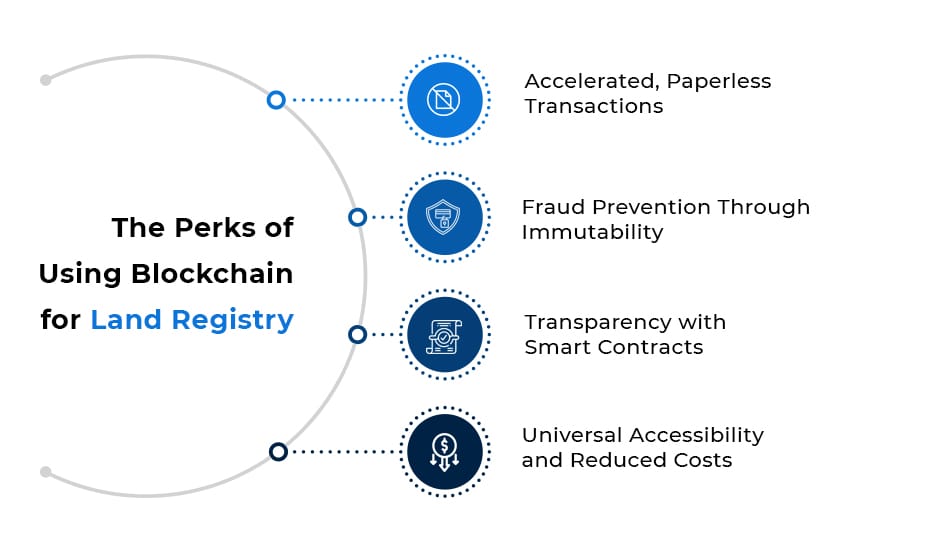
Here’s how blockchain addresses the major pain points in the land registry process:
1. Accelerated, Paperless Transactions
Blockchain turns property titles into digital records and stores them on a shared network. Everyone involved can easily access and verify the information. Hence, there is no need for third-party verification and extensive paperwork. Every action, whether it’s listing a property, transferring ownership, or verifying documents, is recorded on-chain. With blockchain land registry platform development, property transfers can happen in hours or days instead of months, fostering the ecosystem with trust.
2. Fraud Prevention Through Immutability
A blockchain-based land registry creates a secure and immutable record of all property transactions. Once a document is recorded on the blockchain, it cannot be altered, deleted, or forged. This drastically reduces the risk of document manipulation, impersonation, or illegal ownership claims. Cryptographic signatures and time-stamped logs ensure that each change is verified and traceable. This makes fraudulent transactions practically impossible and gives buyers, sellers, and authorities complete confidence in the legitimacy and history of the land title.
3. Transparency with Smart Contracts
Smart contracts on the blockchain land registry platform automate and enforce agreements without human interference. In land transactions, they can verify buyer/seller identities, process payments, update land records, and notify authorities in real time. Once the conditions are met (like payment confirmation), ownership is automatically transferred and recorded on the blockchain. These transparent, pre-programmed contracts reduce the potential for delays or disputes, while providing all stakeholders with a tamper-proof audit trail of each transaction step.
4. Universal Accessibility and Reduced Costs
Blockchain’s decentralized architecture stores land records across multiple nodes. Hence, it eliminates the risk of data loss due to single-point failures. Unlike traditional paper records or centralized databases that can be lost, hacked, or corrupted, blockchain ensures permanent availability and integrity of data. Even in the event of natural disasters, power outages, or cyberattacks, the information remains accessible and unchanged. This secure, digital preservation of property records provides long-term protection and legal clarity, giving both citizens and governments peace of mind.
How a Blockchain Land Registry Platform Works – Step-by-Step Process
Let’s walk through how the blockchain land registry platform works:

Before we move further, one should know the stakeholders involved in the blockchain land registry platform:
Stakeholders:
- Buyer: Wants to purchase a property
- Seller: Lists and transfers ownership
- Land Inspector: Verifies records and facilitates the transfer
Step 1: User Onboarding
The first step is to sign up on the platform. Buyers and sellers need to submit personal details and verified government IDs to sign up. This information is encrypted and stored on the blockchain as a unique digital identity, which allows only authenticated users to participate in transactions. It reduces the risk of impersonation and unauthorized activity.
Step 2: Property Listing by Seller
Sellers upload detailed property information, such as photos, documents, location, and ownership history. This data is time-stamped and recorded immutably on the blockchain. The property listed on the platform is publicly accessible to verified users. This accessibility and transparency prevent the duplication or falsification of property listings.
Step 3: Buyer Requests Access
Buyers explore available properties and submit access requests for specific listings. Sellers receive notifications and can review the buyer’s profile before granting access. All interactions are logged on the blockchain to ensure transparency and traceability during the negotiation process.
Step 4: Purchase Request and Verification
After reviewing a property, the buyer sends a purchase request. The platform alerts the land inspector, who verifies all documents for authenticity. This step ensures due diligence before initiating the ownership transfer process and maintains the integrity of transactions.
Step 5: Smart Contract Execution
Upon successful verification, the buyer and seller sign a digital title transfer document. A smart contract automatically executes the transaction. It releases payment to the seller and updates the blockchain with the new owner’s details. This eliminates delays and enforces trust through automation.
Step 6: Permanent Record Creation
The completed transaction and signed ownership document are permanently stored on the blockchain-based land registry projects or platforms. Each record is hashed for future verification. If disputes arise, the hash can be matched to validate authenticity, ensuring the document hasn’t been tampered with.

Top Countries Leading the Blockchain Land Registry Movement
Governments worldwide are beginning to recognize the potential of blockchain real estate solutions in combating land-related corruption and streamlining administrative processes. Here’s a look at countries taking proactive steps:
-
United States
In Vermont, South Burlington collaborated with blockchain firm ‘Propy’ to pilot real estate transfers on blockchain. Similarly, Wyoming’s Teton County signed a partnership with Medici Land Governance to transition its post-1996 land records to a blockchain-based platform.
-
Sweden
The Swedish Land Ownership Authority has been experimenting with blockchain since 2016, working alongside ChromaWay to create a blockchain land registry platform that reduces paperwork and ensures secure digital signatures.
-
United Kingdom
The UK’s HM Land Registry launched the “Digital Street” project to explore the use of blockchain for digital property titles. The platform aims to improve accuracy, transparency, and speed across the nation’s real estate transactions.
Conclusion
Land ownership is one of the most valuable assets for individuals and institutions alike. Yet, the systems that protect this ownership are often riddled with flaws. Blockchain real estate solutions offer an opportunity to revolutionize how we manage and protect this vital resource. Today, several countries, such as the USA, the UK, and Sweden, are showing interest in blockchain in land registry. If you’re a government entity, real estate developer, or tech innovator looking to be part of this transformation, investing in blockchain land registry platform development is your gateway to the future.
However, implementing a secure and scalable blockchain land registry platform requires deep expertise in both blockchain infrastructure and real estate regulations. This is where Antier stands out. As a leading blockchain real estate development company, Antier helps governments and enterprises build customized land registry solutions that enhance transparency, eliminate fraud, and streamline operations. From smart contract development to full-scale deployment, Antier is your trusted partner in building the future of land ownership.
